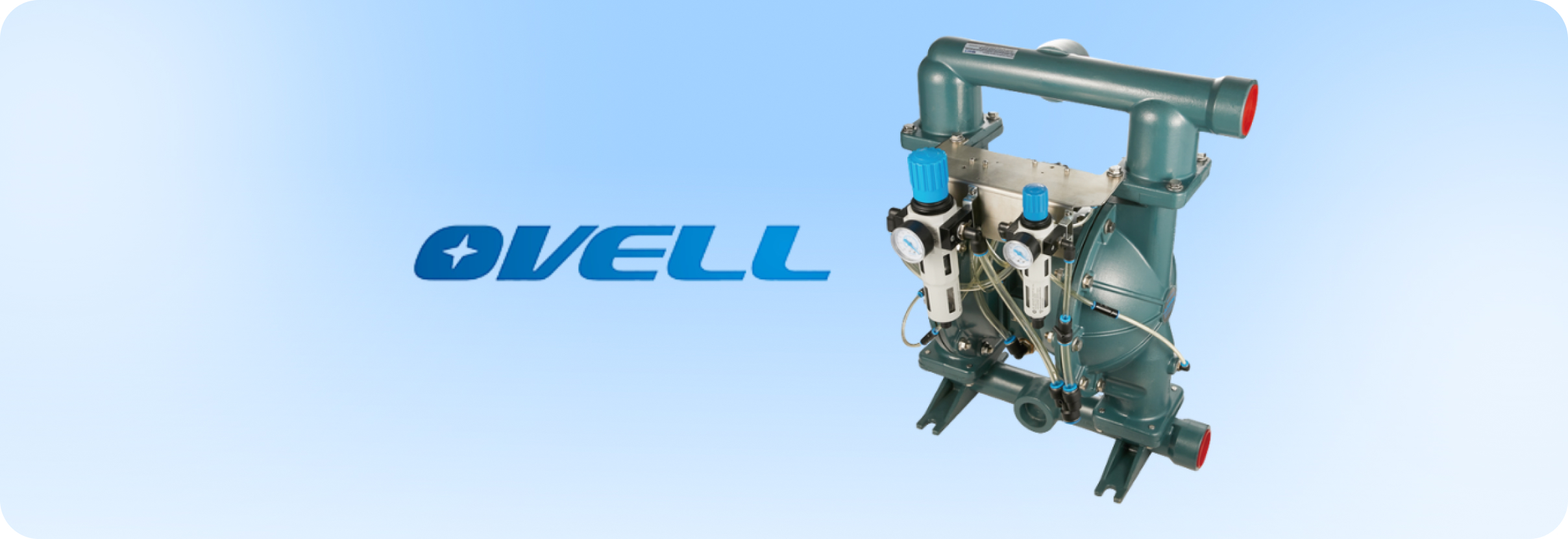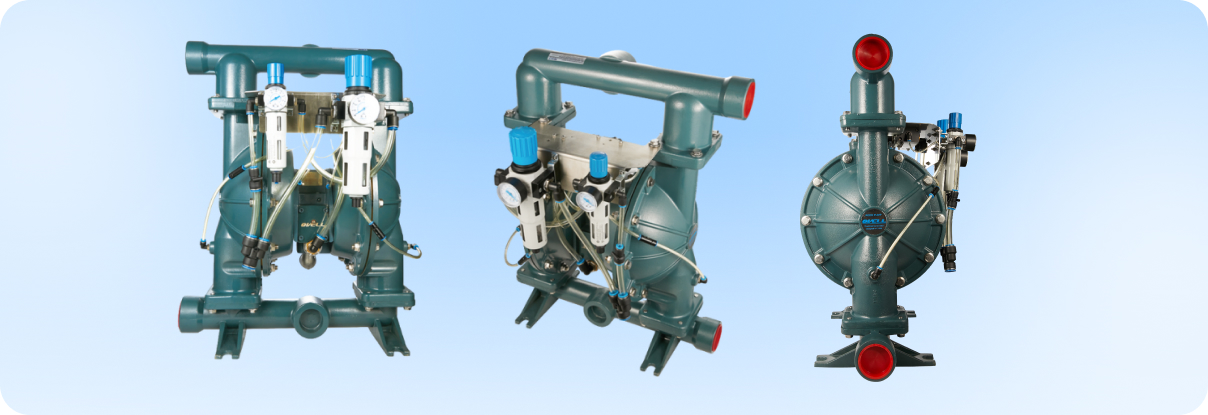
Mon - Fri: 9:00 - 19:00 / Closed on Weekends

AUS: +61 431 085 666
USA: +64 21 480 290


The plastics manufacturing industry is a cornerstone of the modern world, producing everything from automotive components and medical devices to consumer packaging and construction materials. While the industry's innovation is undeniable, the processes involved, particularly in material handling, are fraught with unique and significant challenges. The transfer of dry bulk materials—the building blocks of every plastic product—is often where safety, product quality, and operational efficiency are most at risk. In this comprehensive guide, we will explore the critical role of material handling in plastics manufacturing, detail the dry materials involved, and show how Ovell's specialised pneumatic powder diaphragm pump provides a complete solution for these complex processes.
For plastics manufacturers, the journey from raw powder to finished product is complex and demanding. Traditional material handling methods, such as mechanical conveyors or manual scooping, present a host of problems that can impact both the bottom line and overall safety.
Material Degradation and Fines Generation
One of the most significant challenges is the physical degradation of raw materials. In processes involving mechanical conveyors, screws, and augers, the constant friction and shearing action can break down plastic pellets and granules. This process, known as attrition, creates an undesirable dust, or "fines." These fines not only represent wasted material but also lead to inconsistent product quality, poor surface finishes, and even structural weaknesses in the final product. For precision parts used in the automotive or electronics industries, this degradation can result in costly product recalls and significant scrap rates.
Cross-Contamination and Purity
Plastics facilities often handle a wide variety of materials, from base polymers to specialised additives and colourants. The risk of cross-contamination between different batches is a constant threat. Even trace amounts of a previous material can compromise the integrity of a new product, leading to off-spec colours, compromised material properties, or complete batch loss. Ensuring a clean, sealed, and easily-cleanable system is paramount for manufacturers who must maintain a high level of product purity and quality control.
Workplace Safety and Environmental Concerns
Many of the dry powders used in plastics manufacturing, such as polymer powders, fillers, and additives, are combustible. When these materials become airborne, they create a high-risk environment for dust explosions, which can have catastrophic consequences for a facility and its workers. Additionally, airborne dust can pose a serious health risk to personnel, leading to respiratory issues and other long-term health problems. A clean, dust-free production environment is not just a matter of good housekeeping; it is a critical safety requirement that is often mandated by national and international regulations.
The variety of dry materials used in plastics manufacturing is vast, each with its own unique handling characteristics. The ability to safely and efficiently transfer these materials is a key factor in a plant's overall productivity.
Polymers
Polymers, typically in the form of pellets, powders, or granules, are the primary raw material. Common examples include:
Additives and Fillers
These are crucial for enhancing or modifying the properties of the base polymer. They can be fine powders or granules and are often added in precise, small quantities.
Colorants
Colourants, whether dyes or pigments, are used to achieve the desired colour in the final product. They are typically in a concentrated, powdered form and are added in very small, carefully metered amounts. The ability to transfer these without spillage or cross-contamination is vital to prevent batch contamination and ensure consistent colour matching.

Ovell's specialised pneumatic powder diaphragm pump is a powerful tool engineered to address the specific challenges of dry material handling in the plastics industry. Its design provides a safe, contained, and highly efficient method of transfer, setting it apart from traditional mechanical systems.
Addressing Material Degradation
Unlike screw conveyors or vacuum systems that use high-velocity air, Ovell's pump operates on a gentle, low-velocity principle. The pump creates a vacuum that draws the powder into a chamber, where compressed air then gently aerates the material. This fluidisation process makes the powder flow like a liquid, allowing for a smooth and controlled transfer. This gentle action minimises attrition and the generation of fines, preserving the material's integrity and ensuring the quality of the final product.
Ensuring Purity and Contamination Control
The pump's completely enclosed, sealed-system design is a major advantage. It ensures that powders are transferred from their source—be it a drum, bag, or silo—directly to the processing equipment through a sealed pipeline. This eliminates exposure to the external environment, preventing the ingress of dust, moisture, and other contaminants. For facilities that produce multiple products, this sealed system also prevents cross-contamination between different batches. The simple design, without complex moving parts or seals, makes it easy to clean between different product runs, saving valuable time and resources.
Enhancing Workplace Safety
Since the pump is an air powered diaphragm pump, it contains no electrical components. This makes it an intrinsically safe solution for transferring combustible powders in hazardous environments. By containing the material within a sealed pipeline, it prevents the escape of airborne dust, significantly reducing the risk of dust explosions and improving air quality for workers. The absence of heavy, moving mechanical parts also reduces manual labour and the risk of injuries associated with handling traditional equipment.
Precision Dosing of Additives
The pump's ability to provide a consistent, measured flow makes it ideal for the precise dosing of additives and colorants. Manufacturers can use the pump in conjunction with a weigh system to add specific amounts of powder to a mixing tank or extruder. This precision is critical for maintaining product consistency and reducing material waste, especially with expensive or highly potent additives.
While the pneumatic powder diaphragm pump is a specialised solution for dry material transfer in plastics manufacturing, Ovell Pump is a holistic diaphragm pump manufacturer with a wide array of pumping solutions designed for the full scope of industrial needs.
Standard Pumps
These versatile pumps form the foundation of our offerings. They are designed for a broad spectrum of general-purpose applications where reliability and durability are paramount.
Specialty Pumps
Our specialty pumps are engineered to address unique and demanding applications that require a tailored solution.
For plastics manufacturers, the challenges of dry material handling are a significant barrier to efficiency, safety, and product quality. Ovell's pneumatic powder diaphragm pump offers a purpose-built solution that overcomes these obstacles. By providing a gentle, sealed, and safe transfer method, it not only minimises material degradation and contamination but also enhances workplace safety and overall productivity. As a leading diaphragm pump manufacturer, Ovell provides a wide range of industrial diaphragm pumps to serve the full spectrum of industrial needs, proving that the right equipment can transform complex processes into streamlined and reliable operations.